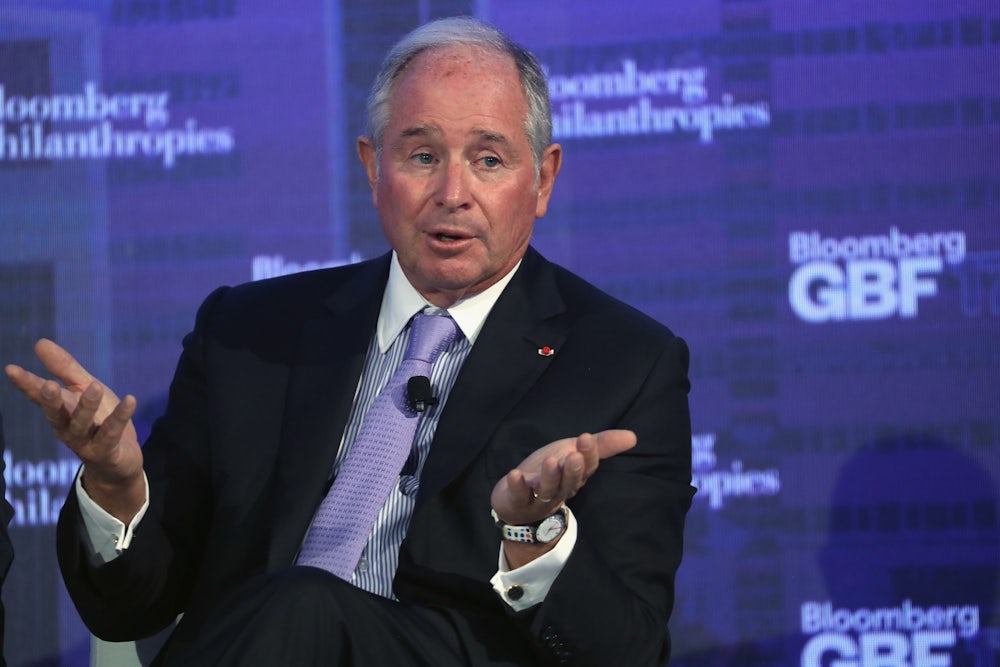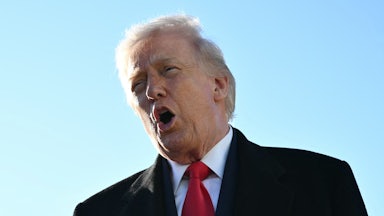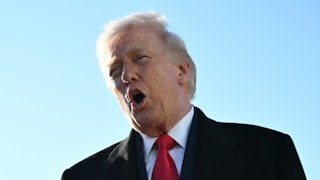I’ve written a good bit about the economic wreckage wrought by President Donald Trump’s economic policies—tariffs, manipulation of the Federal Reserve, a deficit-doubling tax cut for the rich—and how these might tank the economy. Today let’s consider how, even if Trump weren’t president, the finance sector could tank the economy all by its lonesome through shadow banking, most especially in the private equity industry.
The term “shadow banking” was coined in 2007 by a money manager named Paul McCulley to describe financial institutions that mimic what commercial banks do—money markets, mortgage companies, investment banks, hedge funds, and, yes, private equity—but are not regulated like banks. It’s called shadow banking because these firms lack banks’ transparency. Shadow banks furnish a higher return than banks typically do, but their investments are much riskier and lack government protections for investors. Much of the mischief in the 2008 financial crisis was caused by shadow banks, whose combined assets were as large or perhaps larger than those of commercial banks. Five years later, shadow banks’ holdings represented nearly 80 percent of global gross domestic product. Nobody disputes this makes the global financial system less secure.
Even those parts of the financial system that would seem to have nothing to do with you and me can disrupt our lives. I’d never even heard of “family offices” until I read Chuck Collins’s excellent 2021 book, The Wealth Hoarders: How Billionaires Pay Millions to Hide Trillions. (Clearly, I don’t hang with the right crowd.) Family offices are organizations set up by very rich people to preserve their wealth over multiple generations; they’re more or less Thomas Jefferson’s worst nightmare.
Although family offices have been around a long time—the Cabots and the Lowells had them in the nineteenth century—more than half of those now in existence, per Collins, were created in this still-young century. Jeff Bezos’s dad just expanded his. Sometimes family offices combine into multifamily offices, or family funds. Vacationing in Nassau last year, I drove past what looked like a Walmart or Costco; on closer inspection, it was a big-box family fund. (It won’t surprise you to learn that family funds flourish in tax havens like the Bahamas.)
Family offices and family funds are perhaps the most blatant engines of what Thomas Piketty calls “patrimonial capitalism.” That makes it tempting to greet the prospect that they might collapse with a hearty, “Good riddance!” And yes, if they declined in some gradual, stately manner like the Magnificent Ambersons, that’s what I’d say too.
The trouble is that they’re at least equally likely to decline abruptly, taking the rest of us down with them. As The Economist observed in 2018, “Family offices could endanger the stability of the financial system. Combining very rich people, opacity, and markets can be very expensive.” When the family fund Archegos went bust in 2021, it cost Credit Suisse and Morgan Stanley more than $10 billion, with ripple effects in the stock market of $33 billion. If your retirement fund held stock in CBS or Discovery then it was hard cheese for you.
The corner of shadow banking that appears shakiest today is private equity, which is what we called leveraged buyouts before the convicted junk-bond king Michael Milken gave them a bad name in the late 1980s. Private equity firms use debt to buy existing firms; manage them to be more profitable, typically through layoffs; then take them public. Defenders of the practice used to say this made the target companies more efficient. But today almost everybody who doesn’t work in private equity hates private equity for loading up companies with insurmountable debt and raking in so much money on fees that private equity firms don’t have to care all that much whether this or that company survives.
Another common criticism is that private equity puts the squeeze on certain enterprises—hospitals, retirement homes, even hospice providers—that were never intended to be profit-maximizers, weakening the quality of the vital social services they provide. Can’t afford to buy a house? In his latest book, Burned by Billionaires: How Concentrated Wealth and Power Are Ruining Our Lives and Planet, Collins demonstrates various ways in which private equity drives up housing costs. One Ohio firm invests in short-term and vacation rentals—Airbnb, Vrbo, etc.—to the tune of $1.5 billion, with capital from the Blackstone Group and other 800-pound gorillas in private equity.
Lately I’ve had trouble reconciling two story lines in the financial press about private equity. One story line is that private equity is taking over the world. The other is that private equity is on the verge of extinction. Bethany McLean, the superb financial reporter who last week started a column in The Washington Post, squared the circle in her inaugural essay by explaining that private equity is swallowing up everything in sight precisely because it’s in financial trouble.
McLean’s piece was about President Donald Trump’s executive order last month directing the Labor Department and the Securities and Exchange Commission to ease fiduciary requirements to encourage people to invest their 401(k)s in private equity and other “alternative assets,” by which Trump meant shadow banks. As it happens, Blackstone’s chief executive, Stephen Schwarzman, gave $37 million to Republican and conservative groups in the last election cycle. I’m sure that’s just a coincidence.
Trying to herd grandma into private equity is insane. The rationale for private equity going unregulated is that the customers are either rich people or investors for giant pension and other funds who are savvy enough to take risks you and I shouldn’t, and rich enough that, should the risk go sour, no great harm is done. That’s the precise opposite circumstance from defined-contribution pensions, which until now have been regulated to the hilt to protect grandma from getting swindled. McLean doesn’t put it as bluntly as I do here, but her bottom line is that while you don’t particularly need private equity, “it is absolutely clear that private equity needs you—or rather, the trillions of dollars Americans have in our retirement accounts. Without our money, the industry is slamming into a brick wall of its own making.”
I phoned McLean to ask her whether that brick wall is something that you and I need to worry about. Might private equity take us down with it? Absolutely, she replied. “Private equity has become too big to fail,” she said, “which raises a whole question of whether it should be private at all.” The solution, McLean said, is to regulate private equity as we do commercial banks and public corporations, with comparable transparency and legal limits on what it can do with our money.
Private equity started to falter around the time Lina Khan became chair of the Federal Trade Commission, because any limit on mergers is a limit on how private equity firms reassemble the companies they acquire. Rising interest rates dealt another blow. Mostly, though, private equity was a victim of its own success. It ran out of things to buy and bid up the price of whatever was left. Default rates for private equity–backed companies, McLean pointed out, hit 17 percent during the previous three years, more than double the rate for companies not backed by private equity.
By 2022, nearly half of all the supposedly slimmed-down and tuned-up companies exiting private equity firms were sold to other private equity firms, prompting one investor to tell The Financial Times, “This is the start of, potentially, I’m saying ‘potentially,’ a pyramid scheme.” In January, the FT columnist John Plender, writing about systemic risks in private equity, concluded: “No prizes for guessing where the next financial crisis will emerge from.”
Of course, Trump doesn’t help matters by urging us all to throw our money into private equity and other risky shadow banks. But barring strict regulation of this sector to a degree that seems politically impossible at the moment, these outlaw financial institutions are fully capable of crashing the economy on their own.










